Welcome to the world of Megagames: 300 players take part in Watch the Skies! board game
The giant board games are played by hundreds of people in the same room. The only rule: the rules are deeply confusing
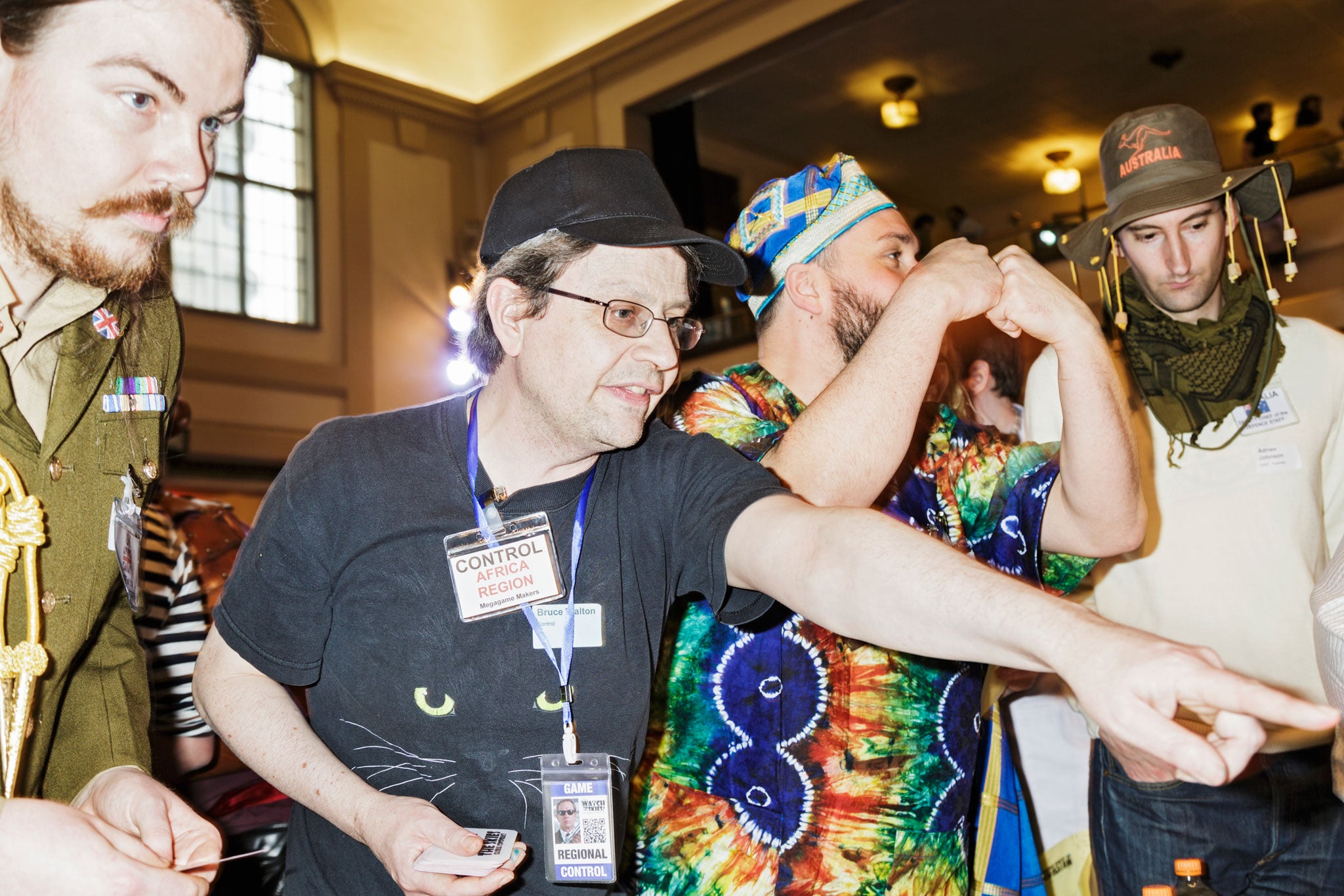
Your support helps us to tell the story
From reproductive rights to climate change to Big Tech, The Independent is on the ground when the story is developing. Whether it's investigating the financials of Elon Musk's pro-Trump PAC or producing our latest documentary, 'The A Word', which shines a light on the American women fighting for reproductive rights, we know how important it is to parse out the facts from the messaging.
At such a critical moment in US history, we need reporters on the ground. Your donation allows us to keep sending journalists to speak to both sides of the story.
The Independent is trusted by Americans across the entire political spectrum. And unlike many other quality news outlets, we choose not to lock Americans out of our reporting and analysis with paywalls. We believe quality journalism should be available to everyone, paid for by those who can afford it.
Your support makes all the difference.Tokyo is a smoking crater, every cat in Africa has vanished in mysterious circumstances, and the Pope seems to have relocated the Vatican to the Moon. The world is not in a good way. But don’t fret – it’s not really the apocalypse, and the Saturday magazine probably isn't the first place where you'd first hear about that anyway. No, we're playing a megagame called Watch the Skies!, and if the real Holy Father hasn't made it to the Moon, there’s still a man dressed as him standing on a balcony in a town hall in north London surrounded by folks in deely bobbers, and after eight hours of this, I’m not sure I have the mental energy to properly tell the difference.
To all intents and purposes, both to me and to the 299 other people, I am the Prime Minister of Australia. You can tell, both because I’m wearing a cork hat and a suit, and because every time the aliens blow something up, I mutter “stone the crows” to myself. For the entire day, we’ve all enthusiastically been role-playing the end of the world.
It’s difficult accurately to encompass in words the sheer bedlam in the room, which is large but still elbow-room only as frantic fake scientists rush about trying to get fake global consensus to deal with a fake asteroid heading for fake Earth. For those of you who had a model UN at school, it’s a little like that, in that tsunamis and local wars keep breaking out, but there are aliens and everyone has all these tanks, itching for a fight – and they’re all dressed up as Frenchmen or Nigerians or Turks.
In the middle of it is me, a bewildered man in a silly hat, a Hawaiian shirt, and the suit I usually wear to weddings, trying to make sense of the maelstrom of activity, my respect for (the real) David Cameron’s poker-faced diplomatic bonhomie coming on in leaps and bounds every time I find myself having to lie to an ally about Australia’s under-the-table nuclear summit with Iran. Of which, more later.
The man responsible for all of this is Jim Wallman, a madcap impresario who has spent three months working full time to make Watch the Skies!. For Wallman it’s a break from his day job of, er, designing table-top war games for the Ministry of Defence. He’s now something of a father figure for the nascent megagames movement. What was for years a small society of over-dedicated British gamers has spread worldwide. There are megagames being played everywhere from Southampton to Sydney as ludologists – tired of the limited scope of modern video games – look to play something with a bit more heft. But amid all the sturm and drang of an alien invasion, what actually is a megagame?
Several people describe it as a Larp (Live Action Role-playing Game) crossed with a board game – which it is, functionally: Risk as designed by the Incredible Hulk and a sci-fi-obsessed sixth-form drama teacher.
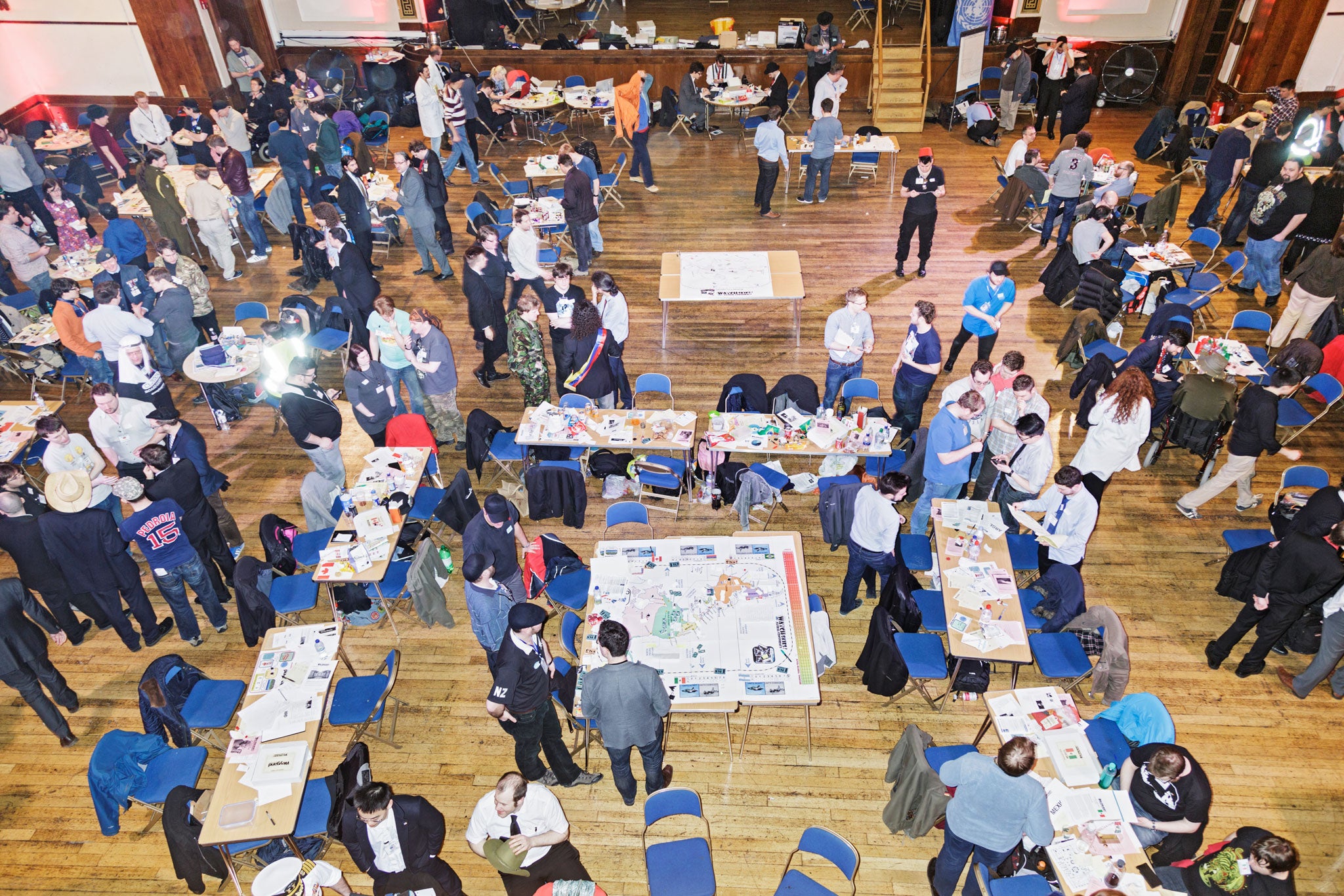
For Jim, though, the beauty of the game isn’t in some arbitrary win condition at the end. Instead, he sees it as more of a large-scale social experiment – a wind-up clock full of free radicals, or a Brownian motion simulator with sentient whales. So the delight he takes is more in what the players can cook up, rather than the brute fact of space battles. He’s designing a game, sure, but he also wants to stress people out by limiting the flow of their information and seeing how they react to sudden changes of circumstance. What they are not, though, are personal-journey simulators.
“The difficult thing for some people to grasp was that they couldn’t be the hero in the story. You’re part of an expanding narrative,” he says.
This is something Team Australia learnt the hard way when we paid pariah state Iran to enrich some warheads for us – and were caught almost instantly. “Extenuating circumstances,” we lied. “Rogue elements of government,” we announced to the massed ranks of the world’s press. (This game is so complicated that yes, it simulates three separate press organisations all playing against each other. It’s the only way for players desperately batting UFOs off at one end of the room to hear that, say, the cats have all gone.)
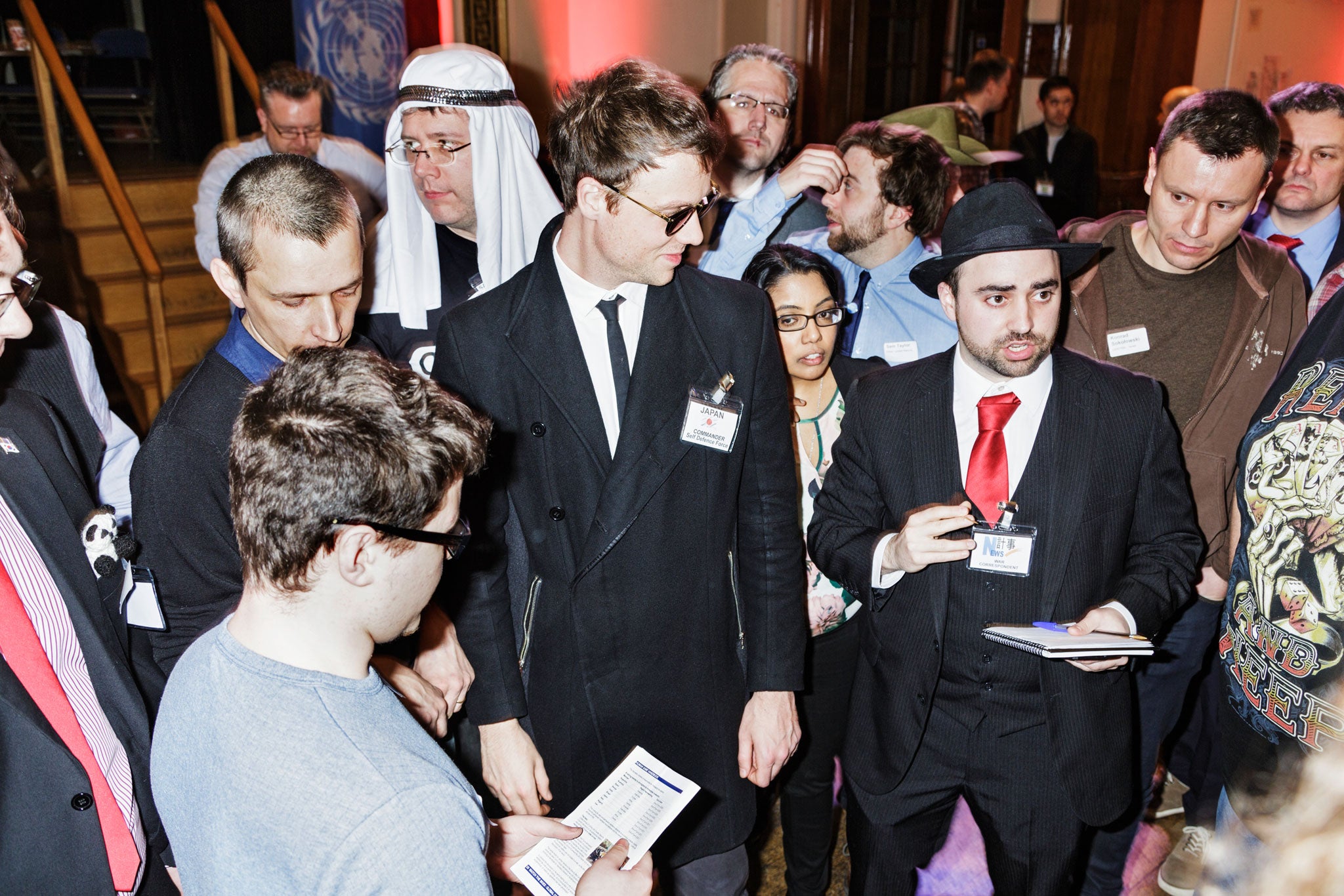
Really, though, we just wanted to get our grimy antipodean mitts on cheap nuclear weapons without troubling the man in the cowboy hat pretending to be the President of the USA. We reckoned, however, without the kind of reputational punishment in-game that real-life Australia might expect to cop if it had paid Iran to develop ICBMs. The game control (one of the 50 men whose job is to apply some form of order to the day) turned out to be a real-life nuclear-weapons policy adviser and he threw the book at us.
This, though, is the beauty of the game. It’s not really about the rules, which for such a large operation are really quite spartan. Jim’s philosophy is to allow players to do whatever they can think of – as long as they accept the consequences.
“Some people wait to be told to do something, and some people get on and do it. On around turn five, people were coming up to me and saying they didn’t know we could communicate with the aliens – it wasn’t explicitly in the rules, but they hadn’t thought to try it.”
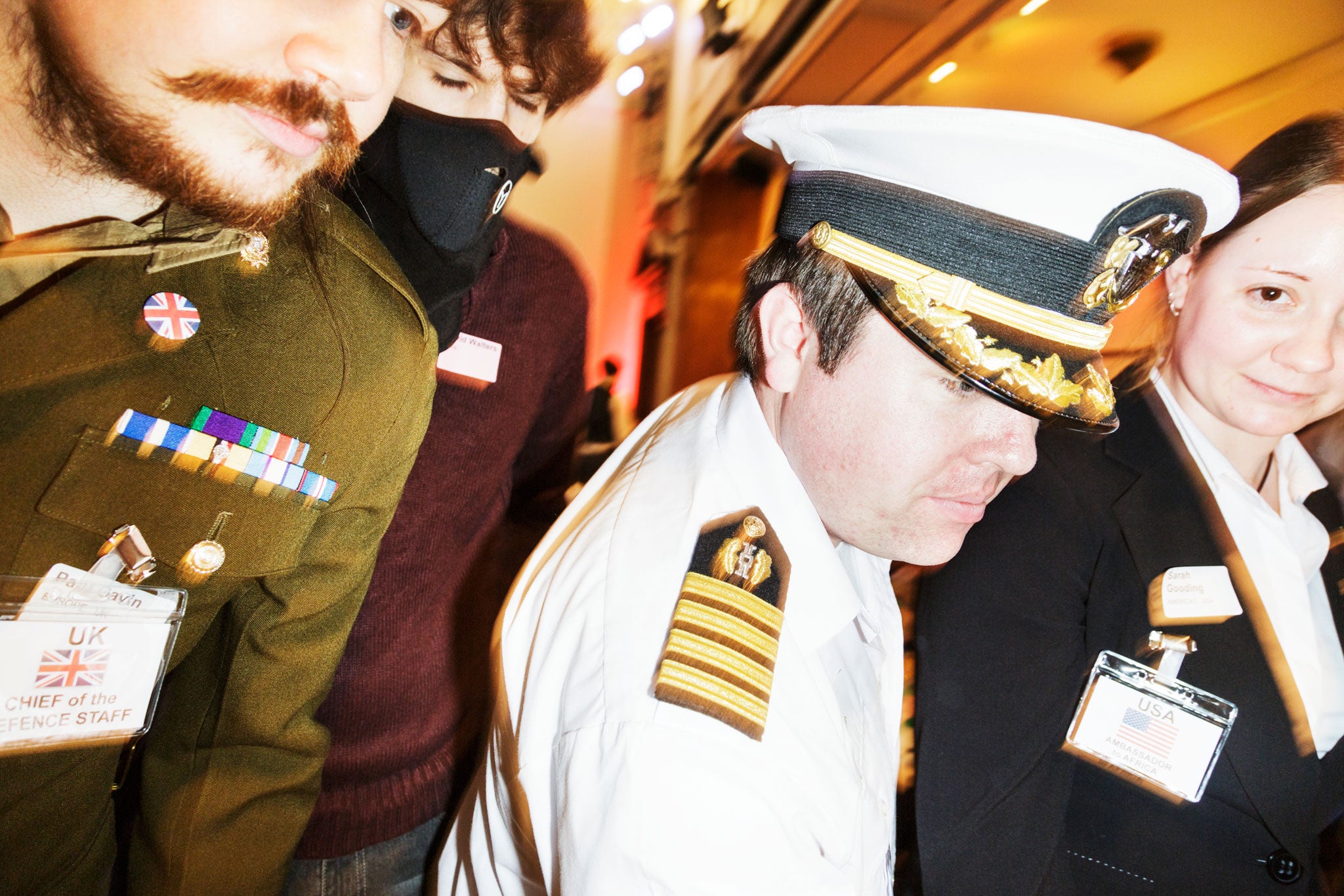
Indeed, the haphazard nature of interstellar communication was adequately simulated by having one harangued-looking man in a ponytail desperately pushing his way through the crowd furtively asking people, “Any messages for the aliens?” like a particularly detached kerbside cannabis salesman.
The beauty of the game is how flexible it is to meet each eventuality – and how much we didn’t see. Jim had designed an elaborate system of nuclear checks and balances. The US President had a suitcase, and so did his Joint Chiefs of Staff. They then had to activate their codes together to launch a strike. And that would have had consequences: expansive rules existed, in secret, for the eventuality of nuclear winter. Jim won’t tell me what would have happened, but it wouldn’t have been nice.
Even something as simple as a language barrier is designed as a hurdle – another game factor designed to complicate our lives and sow confusion. It really scuppered the aliens, who, broadly speaking, came in peace but had no way to express it, and whose diplomats were shot down with customary Earth gusto. Australia’s dashing Air Marshal Crocodile George was even mentioned in dispatches for wrecking nearly every alien envoy’s flying saucer that came within 3,000 nautical miles of Sydney, almost single-handedly ruining chances of alien-human rapprochement in the South Pacific.

Unbeknownst to us puny humans, there was in fact an elaborate Great Game-type affair going on in space, too, with six alien races vying for control of all of our lovely rare Earth minerals, various temples under the Arctic tundra, and our whales, for uncertain reasons.
I’m here – like an awful lot of my fellow players – due to a video I watched from a group of board-game journalists called Shut Up & Sit Down. Paul Dean, one of their number, reckons megagaming is a totally fresh experience.
“I’ve never seen anything quite like this before,” he says. “As well as the obvious sense of scale, what makes megagames different is probably the emphasis on the political and the human element. The imperfection of communication is a big issue – misunderstanding, misinformation, not getting the whole picture. Jim revels in it; he always finds some way to cause people to misunderstand each other and he’s delighted when that spirals into a massive drama.”
Putting his own contribution to the sudden explosion of megagames aside, Paul believes that now video games have entered the true mainstream, table-top gaming will start to grow in the same way.
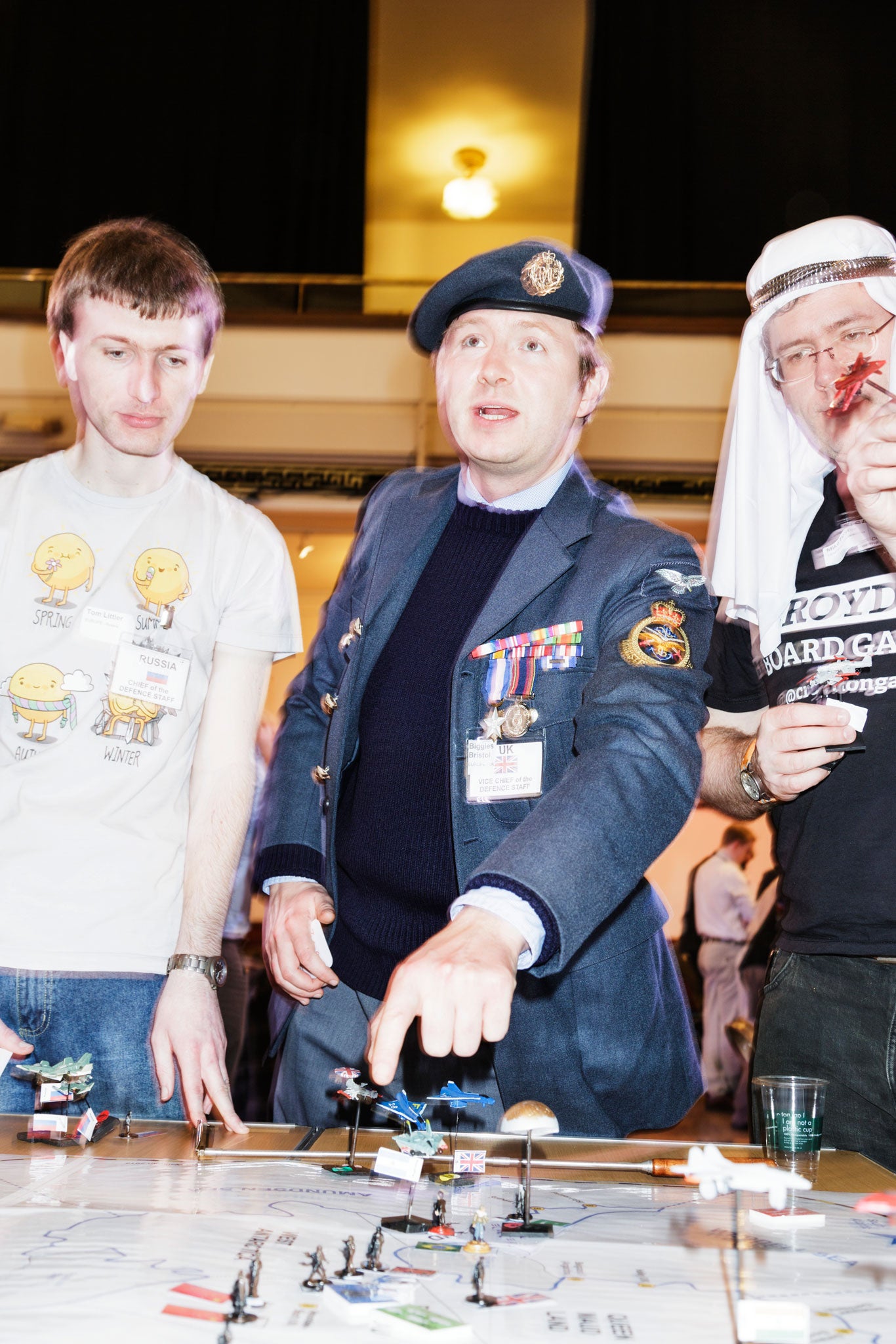
"The rise of video games has got more people interested in play as a pastime,” he says. “But with the rise of the internet we’ve forgotten what it was like to play games in the same space, and board games have jumped on people’s need for that.”
“For quite a long time we’ve associated games with computers, and it’s a chance to play with physical things again, and build them and touch them.”
As far as Jim knows, this gathering is the biggest game played face to face in history, near enough. “The nearest thing I’ve come across is a 300-player zombie Nerf-gun game at Sydney University, but that’s obviously very different. And I know there are some big Larps in California, but those still only have about 100 people at any one time.”
Has he got anything bigger planned? He looks shifty for a moment, and then admits he does. In fact, he’s kicking around thought processes for a 1,000-player game. And then his eyes light up and he’s off.
“The game I have in mind is a game about the Roman Empire. You could replicate that across every province of the Roman Empire. AD69 would probably be a fantastic year, because it was the Year of the Four Emperors, and there was so much going on. You’d have regional games linked together by the Empire.”
Back at the game, the Japanese high command (Paul and his crew) are ashen-faced. Tokyo has been obliterated from space, in a complex dispute over whaling – the whales turned out to be sentient, but the Japanese government didn’t work this out until after they butchered them as they gathered in Tokyo harbour for a demonstration of friendliness. For the briefest of moments, they looked as if they thought actual Tokyo had really been destroyed.
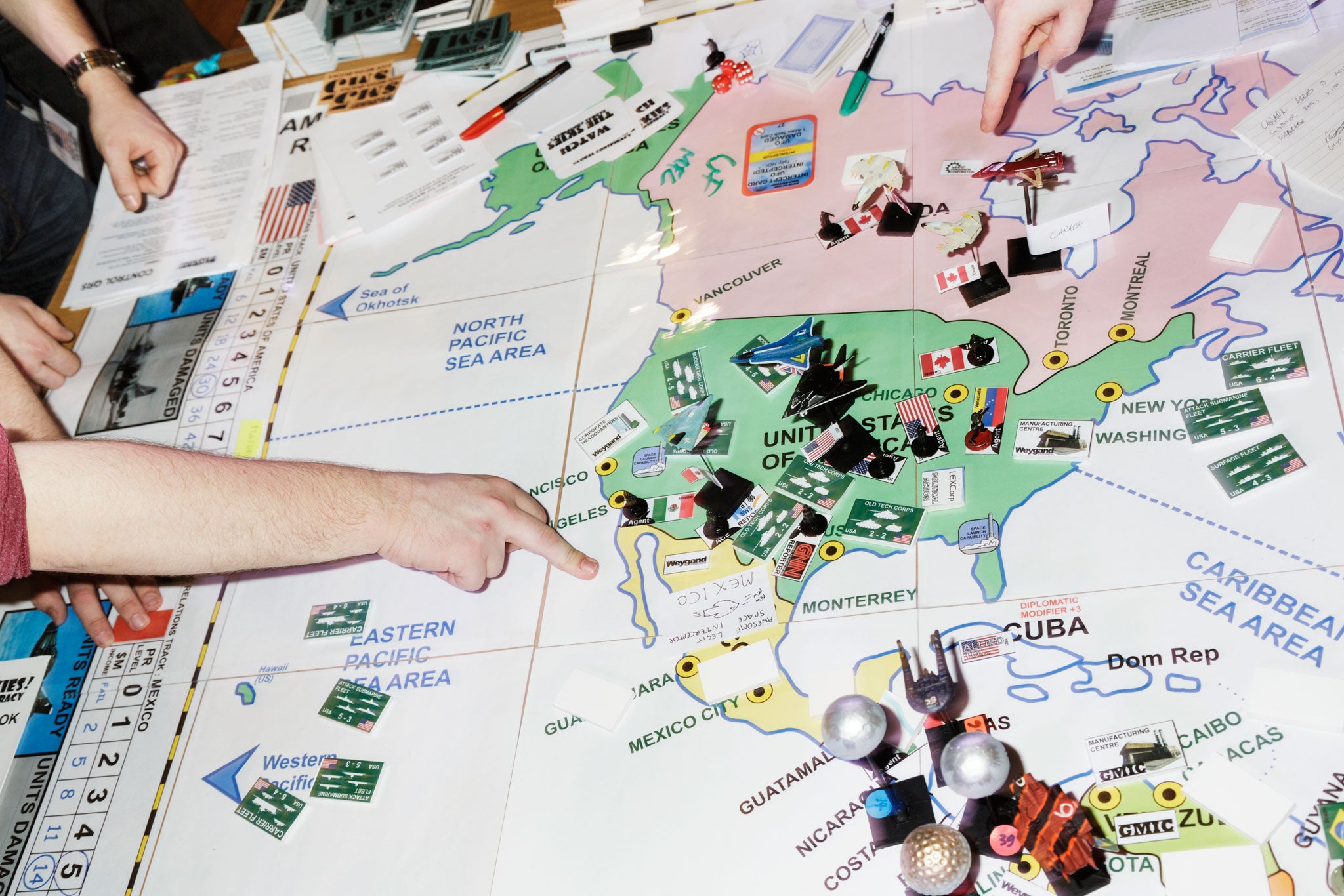
The susurrus of shock that rippled throughout the earth-hall after it was announced was palpable, as hundreds of people a little too deep into the day’s make-believe suddenly got a severe dose of their own mortality. Moments like this – unscripted but perfectly possible as 300 competing personalities set inexorable chains of events into motion – are why Jim does it.
“I don’t get very much from when it’s all done – because at that point I know the game’s worked. I’m not doing it for the accolades. I’m doing it to see it work. It’s even now only just landing with me what I’ve done. I keep looking back and wondering, 'Did that really happen?'"
How to play a megagame (or at least try)
Our megagame – Watch The Skies! – is best seen as a Rube Goldberg machine for human lab rats. There's no way to win – the objective is to participate and see what happens, and any attempt to summarise the mayhem is as doomed to fail. There are 30 countries, mostly with teams of six, except China, the US and Russia, which are larger. Typically, people play as heads of state, diplomats, generals, and scientists, with each role being wildly different. The "world" is divided into six huge maps surrounded by fretting commanders. Diplomats run round the room desperately making deals and finding information from other countries, while scientists go off into their own little worlds and come back with hovertanks and moon rockets and 4D TVs. Heads of state, as far as I could tell, were competing to tell each other the biggest possible lies without being caught out.
There are also five megacorporations, whose job it is to bleed the world dry in return for weaponry; three competing newspapers, who keep the rest of us informed; six teams of aliens, who make running a free world unnecessarily difficult; and a Vatican, just because.
Moderating the chaos are 50-odd men in black hats – control players, whose job it is to moderate what's happening in the madness. They can also facilitate anything players can think of to do – the rules are kept deliberately loose to allow for blue-sky thinking. Easy!
Join our commenting forum
Join thought-provoking conversations, follow other Independent readers and see their replies
Comments